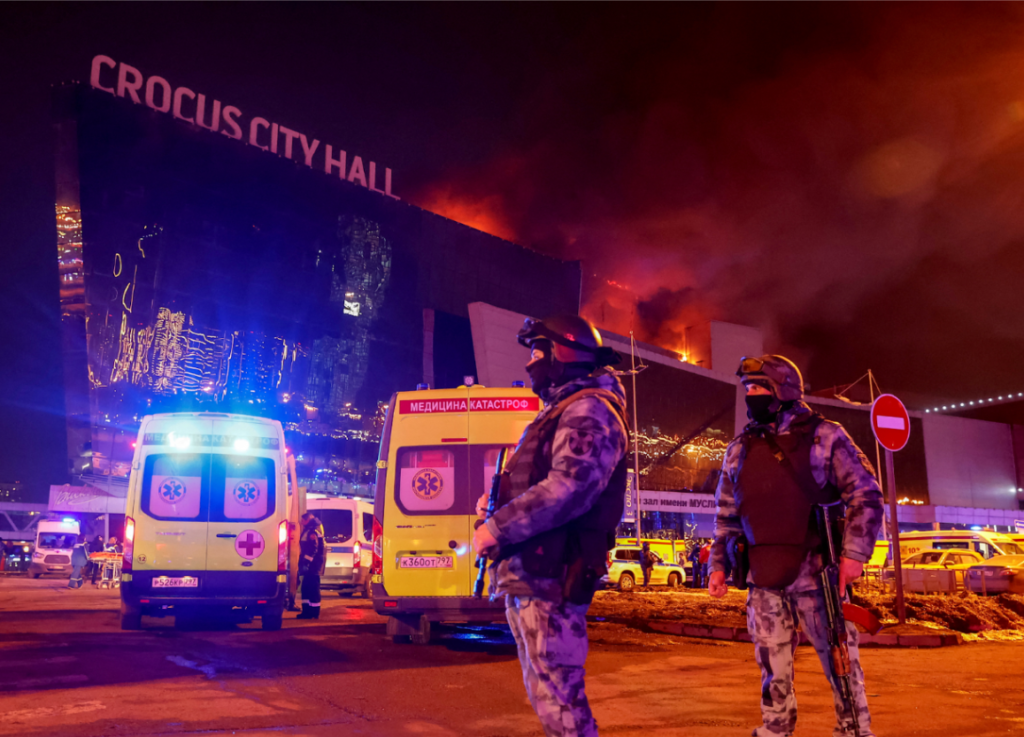Over 130 Killed In Moscow Terror Attack

Photo by CNN
By Patrick D. Lewis
At least 137 people were killed and over 180 injured in the deadliest terror attack to strike Russia in 20 years on March 22. Russian authorities say the four suspects in the attack are in custody. The Islamic State claimed responsibility for the attack.
The attack happened at the Crocus City Hall, a Moscow concert venue, just before a sold-out rock concert was slated to begin. Over 6,000 people were in attendance when the attack began at 8 pm local time.
According to Russian law enforcement and as seen in videos taken by witnesses, four men wearing combat fatigues entered the building and opened fire with machine guns. The suspects also used pistols, knives, incendiary devices, and improvised bombs. The attack lasted less than 20 minutes.
The attacks shot and stabbed victims at point-blank range, used grenades, and ultimately bombed the building, causing the roof to collapse and a massive fire to break out. Firefighters and law enforcement descended on the scene, followed by federal tactical teams and military forces.
The Russian Federal Security Service (FSB), the country’s primary homeland security agency, initially said 60 people had been killed, but the death toll has continued to rise as rescue personnel have searched the rubble for victims.
All four of the gunmen initially fled the scene; the security guards at the concert were not armed and could not stop the attack. Russian security forces later found two of the attackers and the other two were reportedly stopped by Belarussian border guards as they were trying to leave the country. At least seven other people were detained, some of them at the scene, for suspected involvement in the attack. The Investigative Committee, Russia’s top criminal investigations agency, is leading the investigation into the attack.
Shortly after the attack, the ISIS-K faction of the Islamic State released a statement claiming responsibility for the attack. The terror group later released bodycam video from the attackers. ISIS-K is the same group that carried out a bombing in Iran in January that claimed 94 lives. The group, which is based in Afghanistan, has been gaining strength since the 2022 US withdrawal from Afghanistan; the group is opposed to Iran’s government and the forces of Syrian president Bashar al-Assad, both strong allies of Russia. In the statement claiming responsibility, ISIS-K reported that they attacked “a large gathering of Christians… killing and wounding hundreds and causing great destruction.”
The attack has been a major blow to Russian President Vladimir Putin, who was reelected in an election widely regarded as completely rigged just last week. Putin presented his “victory” as one proving Russia was united behind him and against the West, especially in regard to the war against Ukraine.
Meanwhile, governments across the globe have condemned the attack as an act of terrorism. The US, though, also criticized the Russian government for not preventing the attack. US officials said they had been tracking a threat in Moscow for some time, which led the US Embassy in Moscow to issue a warning last week to Americans in the city to avoid large gatherings of people. At the time, Putin called the warning “provocative” and “blackmail” and said it was an attempt to destabilize Russia.
Kremlin-backed public figures and Russian government officials were quick to hint at a connection between the attack and Ukraine, with some even floating the idea that the CIA was involved. US and Ukrainian authorities had denied these accusations, which were presented without any evidence.
US intelligence officials, after the attack, told the press that they warned their Russian counterparts about the attack, including sharing the intelligence itself. Russian authorities have disputed the claim and say there has been no contact between Russian and American officials regarding counterterrorism. They added that the breakdown in intelligence sharing is the fault of the US, not Russia.
Russia’s long-term response to the attacks is not yet clear and Russian authorities have not commented on it. However, Russia has a significant military presence in Syria and strong ties to Iran and other governments and factions in the region, so a military campaign, or at least retaliation, against ISIS is not out of the question. In the near-term, Russia will need to continue picking up the pieces, both literally and figuratively, and may need to take steps to restore shaken public confidence in Putin’s administration, a key attribute of which has been homeland defense and stability.





